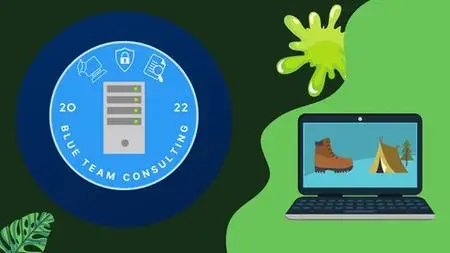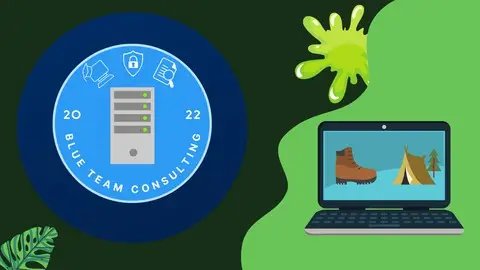Cybersecurity Foundations: From Zero To Pro - Bootcamp
Published 5/2023
MP4 | Video: h264, 1280x720 | Audio: AAC, 44.1 KHz
Language: English | Size: 5.16 GB | Duration: 11h 18m
Published 5/2023
MP4 | Video: h264, 1280x720 | Audio: AAC, 44.1 KHz
Language: English | Size: 5.16 GB | Duration: 11h 18m
Green to Green FREE Cybersecurity Bootcamp - Reach out on Discord
What you'll learn
Understand the fundamentals of how computers function, including numbers, bits, hardware, and memory.
Gain knowledge of operating systems, including a high-level overview, the boot-up process, and the differences between Windows and Linux.
Develop an understanding of networking concepts, including network organization, devices, IP addresses, and protocols.
Learn about the Windows and Unix operating systems, including users, logging, processes, file systems, and commands.
Acquire knowledge of network security concepts, including router and switch configurations, terminology, and subnetting.
Develop skills in analyzing network traffic through PCAP files, including header analysis, Wireshark usage, and identifying attacks.
Understand the basics of vulnerability assessment and management, including the methodology and terminology used by blue teams.
Gain an appreciation of encryption and public key infrastructure (PKI), as well as the security measures required to ensure network security.
Requirements
No prior experience is needed. This course was designed for those who are interested in transitioning into the world of IT/Tech/Cybersecurity
Description
As cyber threats continue to increase in frequency and complexity, the demand for skilled cybersecurity professionals has never been higher. With the rapid digitization of businesses and organizations, there is a growing need for experts who can identify and mitigate cyber risks to safeguard sensitive data and intellectual property. Transitioning into cybersecurity can be a smart career move for individuals seeking job security, competitive salaries, and opportunities for growth and advancement. Additionally, the field offers a range of roles and specializations, including cybersecurity analyst, network security engineer, ethical hacker, and security architect, among others, providing learners with a variety of career paths to choose from.The Cybersecurity Foundations Bootcamp is an intensive course designed to provide learners with a comprehensive understanding of cybersecurity concepts.This course covers the fundamentals of how computers function, including numbers, bits, hardware, and memory.Learners will gain knowledge of operating systems, including a high-level overview, the boot-up process, and the differences between Windows and Linux.The course will also cover networking concepts, including network organization, devices, IP addresses, and protocols, as well as router and switch configurations, subnetting, and security.In addition, learners will develop skills in analyzing network traffic through PCAP files, including header analysis, Wireshark usage, and identifying attacks.The course will delve into the Windows and Unix operating systems, including users, logging, processes, file systems, and commands, as well as the basics of vulnerability assessment and management.Finally, learners will gain an appreciation of encryption and public key infrastructure (PKI), as well as the security measures required to ensure network security.Upon completion of this course, learners will have the knowledge and skills required to pursue a career in cybersecurity or to enhance their existing IT expertise in the field.
Overview
Section 1: How Computers Function
Lecture 1 Module 1.1 Numbers
Lecture 2 Module 1.2: Converting Bits
Lecture 3 Module 1.3: Hardware and Memory
Section 2: Computers and their Operating Systems
Lecture 4 Module 2.1: High Level Overview of OS
Lecture 5 Module 2.2: The Boot Up Process
Lecture 6 Module 2.3: The Windows Operating System
Lecture 7 Module 2.4: The Linux Operating System
Section 3: Introduction to Networking
Lecture 8 Module 3.1: Network Organization
Lecture 9 Module 3.2: Devices and IPs
Lecture 10 Module 3.3: Network Protocols
Lecture 11 Module 3.4: Network Concepts
Section 4: The Beast That Is The Windows Operating System
Lecture 12 Module 4.1: Users, Logging, and the Registry
Lecture 13 Module 4.2: Windows Processes and Logon Activity
Lecture 14 Module 4.3: Windows File System
Lecture 15 Module 4.4: Windows Protocols
Lecture 16 Module 4.5: Active Directory and Commands
Section 5: Hooked on Unix
Lecture 17 Module 5.1: Unix Operating System
Lecture 18 Module 5.2: PIDs, Variables, and File System
Lecture 19 Module 5.3: Miscellaneous
Section 6: Back to Networking
Lecture 20 Module 6.1: Routers and Switches, Again
Lecture 21 Module 6.2: Terminology
Lecture 22 Module 6.3: Security
Lecture 23 Module 6.4: How to Subnet
Section 7: PCAP Or It Didn't Happen
Lecture 24 Module 7.1: Quick Review
Lecture 25 Module 7.2: Header Analysis
Lecture 26 Module 7.3: Wireshark Header Analysis
Lecture 27 Module 7.4: Attacks in PCAP
Section 8: Blue Team Operations
Lecture 28 Module 8.1: Vulnerability Management
Lecture 29 Module 8.2: Methodology and Terminology
Lecture 30 Module 8.3: Network, Encryption, and PKI
Lecture 31 Module 8.4: Where to Be Proficient
Individuals who are interested in pursuing a career in cybersecurity.,IT professionals who want to expand their knowledge in cybersecurity and improve their skills in the field.,Anyone who wants to learn more about cybersecurity and is willing to invest time and effort into a comprehensive program.



